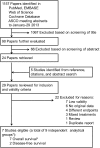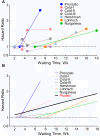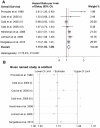Association between delayed initiation of adjuvant CMF or anthracycline-based chemotherapy and survival in breast cancer: a systematic review and meta-analysis
- PMID: 23679207
- PMCID: PMC3722097
- DOI: 10.1186/1471-2407-13-240
Association between delayed initiation of adjuvant CMF or anthracycline-based chemotherapy and survival in breast cancer: a systematic review and meta-analysis
Abstract
Background: Adjuvant chemotherapy (AC) improves survival among patients with operable breast cancer. However, the effect of delay in AC initiation on survival is unclear. We performed a systematic review and meta-analysis to determine the relationship between time to AC and survival outcomes.
Methods: PubMed, EMBASE, Cochrane Database of Systematic Reviews, and Web-of-Science databases (between January-1 1978 and January-29, 2013) were searched for eligible studies. Hazard ratios (HRs) for overall survival (OS) and disease-free survival (DFS) from each study were converted to a regression coefficient (β) corresponding to a continuous representation per 4-week delay of AC. Most used regimens of chemotherapy in included studies were CMF (cyclophosphamide, methotrexate, and fluorouracil) or anthracycline-based. Individual adjusted β were combined using a fixed-effects or random-effects model depending on heterogeneity.
Results: We included 7 eligible studies with 9 independent analytical groups involving 34,097 patients, 1 prospective observational study, 2 secondary analyses in randomized trials (4 analytical groups), and 4 hospital-/population-based retrospective study. The overall meta-analysis demonstrated that a 4-week increase in time to AC was associated with a significant decrease in both OS (HR = 1.15; 95% confidence interval [CI], 1.03-1.28; random-effects model) and DFS (HR = 1.16; 95% CI, 1.01-1.33; fixed-effects model). One study caused a significant between-study heterogeneity for OS (P < 0.001; I² = 75.4%); after excluding that single study, there was no heterogeneity (P = 0.257; I² = 23.6%) and the HR was more significant (HR = 1.17; 95% CI, 1.12-1.22; fixed-effects model). Each single study did not fundamentally influence the positive outcome and no evidence of publication bias was observed in OS.
Conclusions: Longer time to AC is probably associated with worse survival in breast cancer patients.
Figures




References
-
- Peto R, Davies C, Godwin J, Gray R, Pan HC, Clarke M, Cutter D, Darby S, McGale P, Taylor C. Comparisons between different polychemotherapy regimens for early breast cancer: meta-analyses of long-term outcome among 100,000 women in 123 randomised trials. Lancet. 2012;379(9814):432–444. - PMC - PubMed
-
- Goldhirsch A, Wood WC, Coates AS, Gelber RD, Thurlimann B, Senn HJ. Strategies for subtypes--dealing with the diversity of breast cancer: highlights of the St. Gallen International Expert Consensus on the Primary Therapy of Early Breast Cancer 2011. Ann Oncol. 2011;22(8):1736–1747. doi: 10.1093/annonc/mdr304. - DOI - PMC - PubMed
-
- Samur M, Bozcuk HS, Dalmaz G, Karaveli S, Köseoğlu FG, Colak T, Pestereli E. Treatment delay in breast cancer; does it really have an impact on prognosis? Turk J Canc. 2002;32(4):138–147.
-
- Kerbrat P, Roche H, Fumoleau P, Bonneterre J, Romestaing P, Fargeot P, Namer M, Monnier A, Montcuquet P, Goudier M. Does time interval between surgery and adjuvant chemotherapy initiation modify treatment efficacy in operable, breast cancer patients? French Adjuvant Study Group (FASG) Results. J Clin Oncol. 2005;23(16S):660.
Publication types
MeSH terms
LinkOut - more resources
Full Text Sources
Other Literature Sources
Medical

